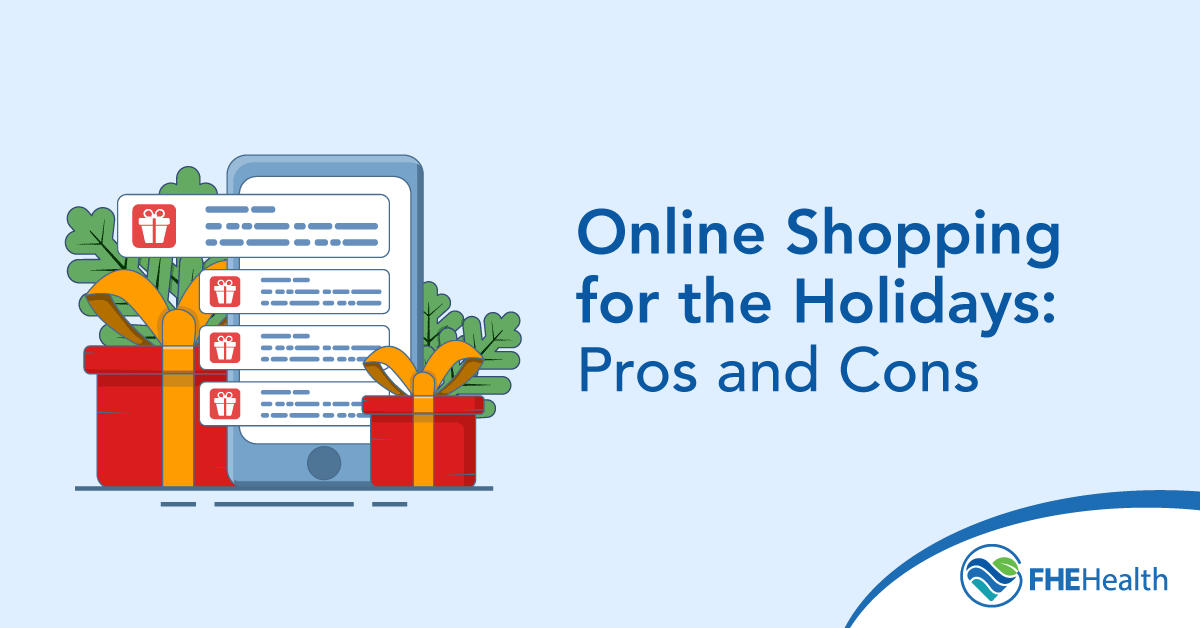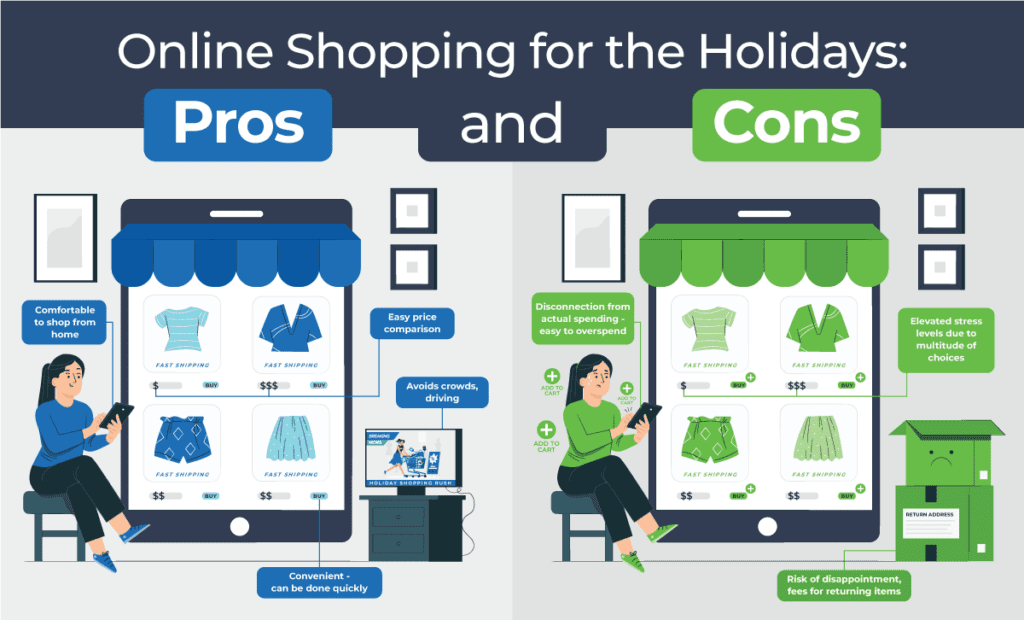
There’s no denying it, Americans love to shop. Forbes reports that shoppers across the United States are projected to spend $240.8 billion online from November 1 to the end of 2024, an 8.4% increase from 2023. And some of it’s understandable. After all, it’s the holiday season, and people need to buy gifts and decorations and take advantage of seasonal sales. But when does it transition from a convenient way to complete an errand to an online shopping problem? Keep reading to learn when online shopping is addictive and what can be done about it.
Online Shopping During the Holidays
Shopping online during the holidays can be a convenient way to get everything you need from the comfort of your own home. Online shopping saves you time, allowing you to compare prices across vendors and do your research in seconds without walking from store to store. The items arrive directly at your home, so you don’t have to lug them around yourself. So it’s easy to see why many people opt for online shopping rather than entering a crowded mall during the holiday season.
But when is online shopping a problem?
Online shopping releases dopamine in your brain. Dopamine is a neurotransmitter that helps us feel pleasure. So, when you click that “buy now” button online, you give yourself an immediate dopamine hit from your brain’s reward center.
You get a second dopamine hit when the package arrives. It’s like a present that shows up on your doorstep. And some of today’s massive online vendors can deliver packages to your door within 24 hours!
Over time, you realize you feel better when you shop, so you might start to seek it out (a habit often referred to as retail therapy). But the danger of online shopping is that it’s always accessible. You no longer have to find the time to make it to the mall or a store. Instead, you can spend all day shopping from your phone, laptop and other devices.
You might be convincing yourself that you’re only buying what you need or items that are good deals, but that can spiral into excessive spending quickly. Many people use the holidays as an excuse to cover up their shopping addiction or unhealthy shopping habits. According to a 2023 Deloitte study, stress relief is one of the most common motivations for making a purchase.
The Pros and Cons of Online Shopping During the Holidays
Indulging in online shopping during the holiday season has its advantages and disadvantages.
Pros
- Convenient. Online shopping is convenient, so you can spend more time with friends and family or handle other tasks.
- Easy price comparison. Online shopping makes it easier to find the best deal.
- Comfortable. Many people find stepping into a crowded mall during the holiday season overwhelming. Online shopping allows you to tackle your gifting in a comfortable setting.
Cons
- Disconnection. Shopping online often feels like you’re dealing with pretend money. You’re simply clicking some buttons, which can make you feel disconnected from how much you’re actually spending.
- Risk of disappointment. Buying something online comes with a higher risk of dissatisfaction, as you don’t see the product until it arrives at your house. If you’re unhappy with your purchase, you have to go through the process of mailing it back. Alternatively, you can keep the item and absorb the loss.
- Elevated stress levels. Online shopping can become stressful if you’re overwhelmed by choices. With so many more stores at your fingertips, deciding where to shop and what to buy becomes more complicated.
Preparing Yourself for a Healthier Online Shopping Season
If online shopping is still the best option for you, you can take steps to reduce the potential adverse side effects.
- Make a list of what you need and stick to it. Don’t be swayed by promotions that arrive in your inbox unless they relate to items on your list.
- Create a budget and update it as you go. Overspending is one of the biggest dangers of online shopping, which adds stress to the holiday season when the bills start to come in. Thirty-seven percent of Americans who overspend and end up with holiday debt say it takes them at least 5 months to pay it off.
- Don’t let emotions dictate your spending. We all know you’re not supposed to grocery shop when you’re hungry. Similarly, don’t shop when you’re sad, as that can lead to overspending.
- Unsubscribe from emails and texts from all retailers. This helps you avoid the temptation to overindulge.
- Find a balance between online shopping and holiday enjoyment. The holidays are about much more than shopping and gifting. Instead, prioritize spending time with loved ones and participating in holiday activities.
- Recognize if you have a shopping addiction. If so, shopping shouldn’t be a priority for you this holiday. Instead, you need to seek help.
What Is a Shopping Addiction?
A shopping addiction is a behavioral condition in which a person can’t practice impulse control when it comes to buying items despite negative consequences. Shopping addictions are also called compulsive buying or oniomania.
What Are the Signs of a Shopping Addiction?
Potential signs of a shopping addiction include:
- Constantly thinking about shopping
- Wanting to stop and being unable to do so
- Feeling intense happiness immediately after shopping
- Experiencing financial issues (debts you can’t pay off) due to your shopping
- Hiding your shopping from others (or lying about it)
- Purchasing things that aren’t needed
- Using shopping as a “feel better” activity when you’re stressed, sad or mad
- Neglecting other responsibilities to go shopping
Seeking Help for an Online Shopping Problem
Shopping can be a real addiction that requires professional mental health treatment. It can be easy to dismiss shopping too much as being irresponsible, but when you want to change and can’t, you’re in the throes of an addiction.
The good news is that shopping addiction is treatable. With the right intervention, you can get your spending habits under control and learn to shop in a controlled and healthy way.
Addiction Help at FHE Health
Don’t let a shopping addiction turn your holiday season into a nightmare. FHE Health is a mental health and addiction treatment facility offering professional intervention services. Our compassionate and experienced counselors can help you understand the compulsions behind behaviors such as shopping addiction. Contact us today to take the first step to a healthier you.







